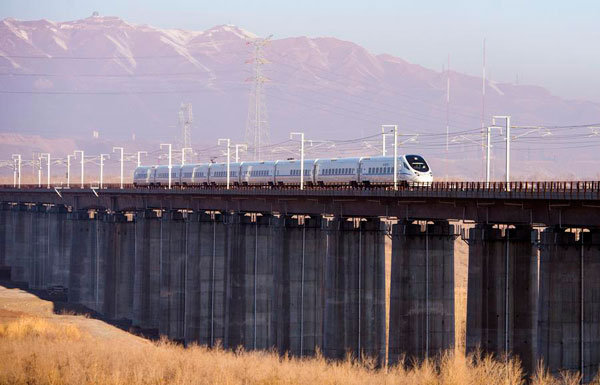
A high-speed bullet train runs from Urumqi South Railway Station to Hami city, Xinjiang, in this Nov 16 file photo. [Photo/Xinhua]
If confirmed, proposal would expand country's overseas market
China is in discussions with India to help it build the world's second-longest high-speed railroad with a price tag of 200 billion yuan ($32.6 billion), its latest efforts to push for a bigger share of the overseas high-speed market.
The Delhi-Chennai high-speed rail corridor will see trains running at 300 km/h, covering up to 1,754 kilometers.
The railway is proposed to be developed jointly with China, home to the world's longest high-speed rail line - between Beijing and Guangzhou - several Indian media organizations reported over the weekend, citing senior officials with India's Ministry of Railways.
Hindustan Times reported that a high-level Indian railways team would visit Beijing on Monday to complete formalities for the project's feasibility study.
The team, comprising officials of the High Speed Rail Corp and the Rail Vikas Nigam Ltd, will sign an agreement with Chinese counterparts, the report said.
"The study on the Delhi-Chennai line can be expected to begin early next year", the report said, citing unnamed ministry officials.
China Daily could not independently confirm the news on Monday, as information officials with China's National Railway Administration, China Railway Corp and China Railway Construction Corp all declined to comment.
However, encouraged by the speculation of this big-ticket rail project between China and India, the stock value of rail infrastructure construction companies rose sharply on Monday, with China Railway Construction Corp and China Communications Construction both up by more than 9 percent on the Shanghai Stock Exchange.
The project is part of Indian Prime Minister Narendra Modi's "diamond quadrilateral" project that aims to build a network of high-speed trains between cities including Delhi-Mumbai, Mumbai-Chennai, Chennai-Kolkata, Kolkata-Delhi and Mumbai-Kolkata, according to Indian media.
Feng Hao, a researcher at the Institute of Comprehensive Transportation at the National Development and Reform Commission, said if the deal is made, the project opens the door for Chinese companies to provide new railway design, tracks made of durable materials, automated signaling for faster trains and modern stations that India’s British-built rail system desperately needs.
India has added 11,000 kms of track in the 67 years since its independence.
China, whose operating rail mileage exceeded 100,000 km by the end of 2013, including 10,000 km of high-speed railroads, is pushing for a bigger share of the lucrative high-speed train market in India and other parts of the world.
"Chinese investment will also help narrow the trade deficit with India, which hit $31 billion in 2013," said Zhao Zhongxiu, a trade professor at the University of International Business and Economics in Beijing.
China pledged to offer investment opportunities and technical assistance in India's rail network to help the country improve transportation during President Xi Jinping's visit to India in September.
Diao Chunhe, president of China International Contractors Association, which helps Chinese companies explore new business in overseas markets, said Chinese rail construction companies are attractive to foreign governments and business partners, because unlike their competitors in Canada, Germany, South Korea and Japan, they come with their own funding model.
"They are capable of coordinating finance for projects through Chinese institutions such as the Export-Import Bank of China or China Development Bank," said Diao. "They also do not generally seek sovereign guarantees when working with local partners."
Also on Monday, Mexican Communications and Transportation Minister Gerardo Ruiz Esparza met Chinese officials to discuss the cancellation this month of a $3.75 billion high-speed rail contract that had been awarded to a CRCC-led consortium, the sole bidder.
Ruiz Esparza discussed Mexican plans to build a $10 billion state-owned and privately operated mobile network with Chinese help, according to a ministry statement.
The Mexican government has already received a bid for the project. The country is aiming to publish the initial terms of the tender to build and run the network in December.